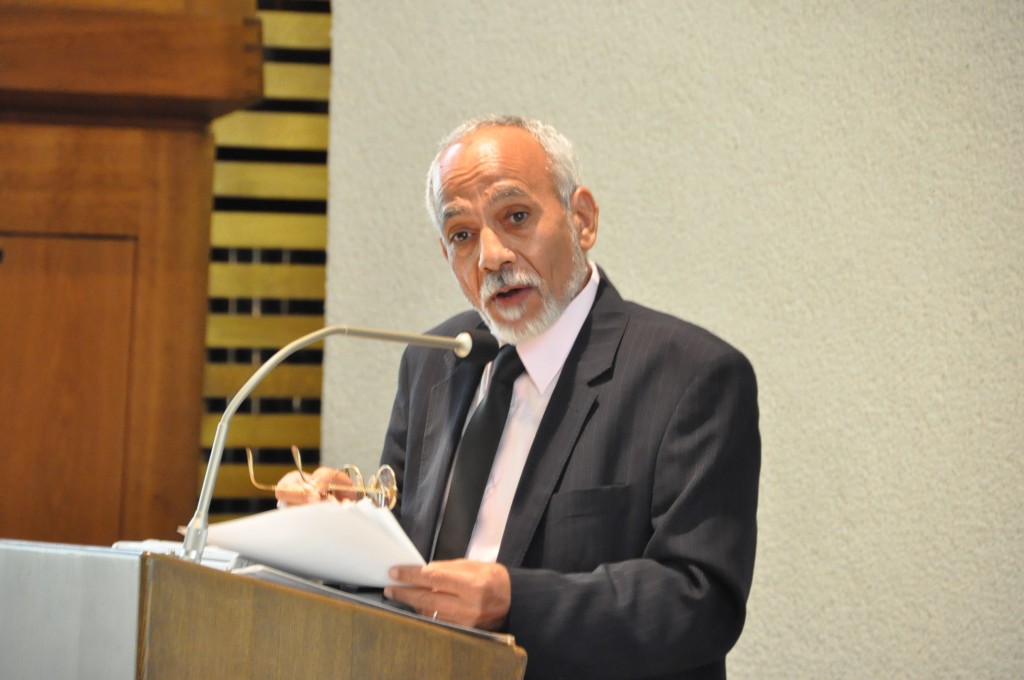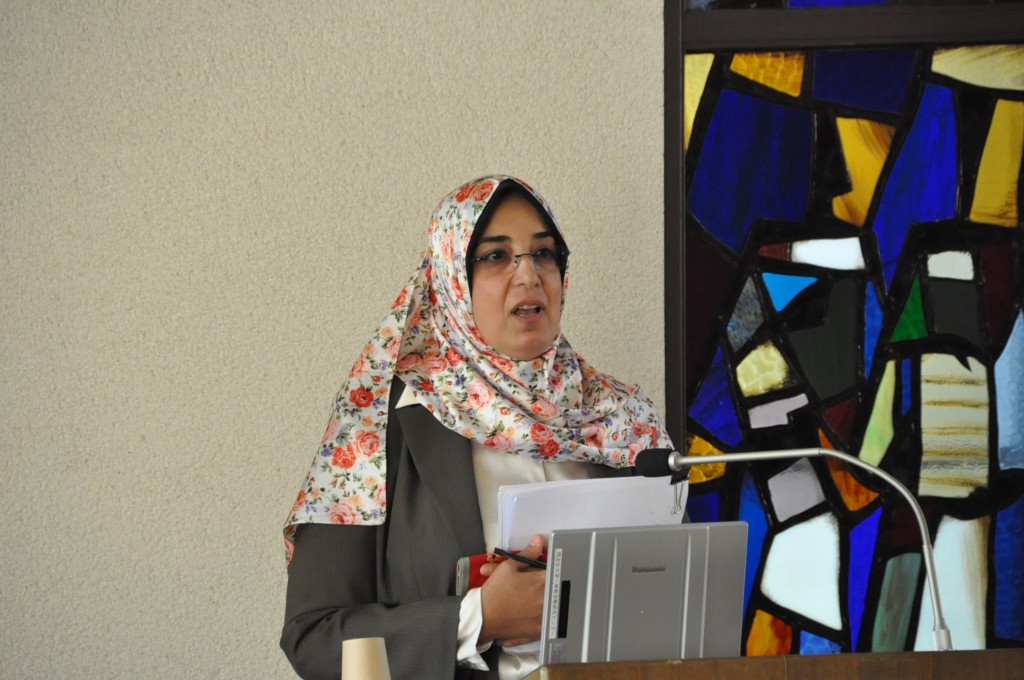Center for Interdisciplinary Study of Monotheistic Religions(CISMOR)Doshisha University
> Public Lectures > Conflict or Consensus among Religious Tradition and Mondern ValuesPublic Lectures
The 2nd Joint Conference on Values in Religion
Conflict or Consensus among Religious Tradition and Mondern Values
| Date: |
2013/09/21 13:00 - 15:30 |
|---|---|
| Place: | Divinity Hall Chapel, Imadegawa Campus, Doshisha University |
| Lecture: | Prof. Mohamed Hawary(Ein Shams University), Prof. Hanan Rafik Mohamed(Cairo University), Prof. Katsuhiro Kohara(Doshisha University) |
| Summary: | |
|
The conference started with a greeting from Professor Gamal Abd El Samea El Shazly, Director of the Center of Oriental Studies at Cairo University, followed by three lectures. First, Professor Mohamed Hawary delivered a lecture titled “Concept of Justice in Judaism and Islam.” In Judaism, “practicing justice” is equivalent to living in accordance with the will of the Creator. The Hebrew word tzedakah, which means “charity” in English and “sadaqah” in Arabic, refers to an obligation in Judaism to give one tenth of one’s income to the poor. Social justice is at the core of Judaism. One of Judaism’s most distinctive ideas is “ethics of responsibility,” which is reflected in the concepts of simcha (joy, pleasure), tzedakah (religious obligation to practice charity and benevolence), chesed (kindness), and tikkun olam (world repair) Yahweh showed that justice is on the side of the Israelites, not other peoples. While some argue that Judaism is a universal religion and does not emphasize the concept of Jews as the chosen people, Jews believe that God offered the Torah to all peoples on earth but only Jews accepted it and Jews have a special status in the eyes of God. In Islam, as well, the Qur’an teaches the importance of practicing justice in all deeds. Justice means treating others equally. Muslims are thus required to practice justice equally for all people, whether friends or enemies, regardless of race, religion, color, or creed. One of the elements that constitute social justice is zakat (alms-giving), which is one of the Five Pillars of Islam. Muslims who have a certain amount of wealth are obligated to give alms once a year. Zakat is an Arabic equivalent of “to purify” and “to grow.” In addition to zakat, Muslims are encouraged to offer sadaqah (voluntary charity). It is a religious obligation of Muslims to accept the idea that all men are equal and to respect human rights, because we are all descendants of Adam, and therefore siblings. Next, Professor Hanan Rafik spoke on the theme “Religious Values and the Concept of Hijab in Egypt Now” in Japanese, making reference to the findings of a survey conducted on Muslims. In Japan, it is widely believed that Muslim women are obligated to wear a hijab but this is not necessarily true. In fact, women not wearing a hijab are commonly seen in Cairo, and young girls do not wear it. Concerning hijab, the Qur’an says “And when you ask [his wives] for something, ask them from behind a partition” in Chapter 33 (The Combined Forces) Verse 53. This verse is interpreted differently by proponents and opponents of hijab: the former read this passage to mean that all women must wear hijab whenever they meet a man, while the latter insist that this passage is applicable only to prophets’ wives. The lecturer conducted a survey on 103 Muslim women aged between seventeen and sixty-four years of age who were not wearing a hijab. To the question “Have you ever worn a hijab?” Sixty-two respondents answered yes and forty-one respondents answered no. According to the survey, these women were not wearing a hijab for the following reasons: (a) Wearing a hijab is not part of the Six Principles and the Five Pillars to which Muslims must adhere; (b) Deciding whether to wear a hijab or not is simply an issue of personal choice; (c) The hijab controversy should not be used to divert public interest from social injustice; (d) Acting ethically is more important than wearing a hijab; and (e) Enjoying dressing up is one thing and respecting religious values is another. As these comments show, the diversification of women’s clothing in Egyptian society is not a reflection of a conflict or friction between religious and modern values; rather, it implies a kind of reconciliation of different values. Lastly, Professor Katsuhiro Kohara gave a lecture titled “How Have the Religions in Japan Been Encountering the Modern Values?: A Lesson for the Post-secular Age.” The draft revision of the Japanese Constitution issued by the Liberal Democratic Party of Japan places special emphasis on public order. Meanwhile, Article 28 of the Meiji Constitution officially guarantees freedom of religious belief, but on the condition that the religious practice is not prejudicial to public order. As such, the Meiji government used this provision to justify religious oppression. After indicating this fact, Professor Kohara discussed the following four issues. (1) The reason to place importance on religion Leaders in the Meiji government were stunned at the importance of the role that Christianity had played in Western society and convinced that the unity of religion and politics with the Emperor at the center would be critical for Japan to become a modern state with the ability to compete on an equal footing with Western nations. The provision guaranteeing freedom of religious belief was incorporated in the constitution under diplomatic pressure, not voluntarily by the Japanese government. (2) The focus of allegiance In medieval Europe, people had allegiance to the church, the Pope, and eventually, God. In the modern age, however, the focus of people’s allegiance shifted to the state. Secular nationalism and religion have justified and idealized death for the sake of patriotism and religious belief, as indicated by Mark Juergensmeyer that “nowhere is this common form of loyalty more evident than in the ability of nationalism and religion, alone among all forms of allegiance, to give moral sanction to martyrdom and violence” (Mark Juergensmeyer, The New Cold War?). We must be very wary of an ideology that idealizes death. (3) Restrictions of the secular world The process of democratization will not move forward simply by separating politics from religion. The dichotomy of private vs. public and of religious vs. secular, and separation of politics and religion based on such dichotomy can in no way contribute to solving the problems that we face today. The idea of separation of politics and religion was conceived in the context of Western society and thus cannot be applied to other societies. Rather, it is more important to recognize that we live in a post-secularist society. (4) Lessons learned and future challenges Regarding Japan, the national government led the development of the concept of publicness and defined the common good, which resulted in the exclusion of non-conforming individuals and minority groups. The national government even led the entire Japanese society into war by forcing citizens to comply with public order. Such a historical background highlights the importance of taking positive action to have dialogue with others. Since the disaster on March 11, 2011, we have seen an increase in people who recognize Japan and the West as two conflicting worlds and emphasize the superiority of Japanese values. These people even attribute the cause of the nuclear power plant disaster to Western values. Such a dualistic framework can give rise to narrow-minded nationalism. Against this backdrop, we are now required to foster the ability to address different cultures in a manner that does not exclude others. (Yasuhiko Sato, Research Assistant, Graduate Student of School of Theology, Doshisha University) |
|
|
-This lecture will be conducted in Japanese and English. Consecutive interpretation provided. -Admission free, No registration required. Hosted by CISMOR and The Center of Oriental Studies, Cairo University |
|
|
Program |
|

